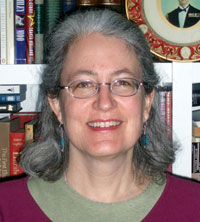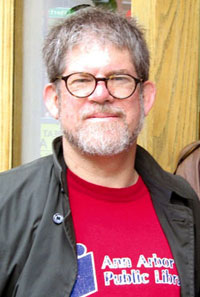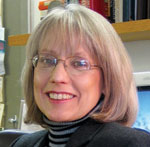A well-stocked Little Free Library by the sidewalk. [photo] [photo]
Stories indexed with the term ‘books’
In it for the Money: Your Public Library
Editor’s Note: At the Ann Arbor city council’s March 17, 2014 meeting, Ann Arbor District Library Director Josie Parker told councilmembers that heroin sale and use takes place at the downtown location of the AADL. The council was debating a resolution about reserving as a public park an area of the surface of the city-owned parking structure adjacent to the downtown AADL.
In rejecting the idea that the problems are caused by the homeless, Parker also told the council that “some of the most obnoxious behavior exhibited at the public library in Ann Arbor is done by persons who are very well housed, very well fed, and very well educated. It is not about those things. It is just about simply behavior.”
Chronicle columnist David Erik Nelson is a frequent visitor to the public library. He drafted this column before Parker made her comments. And he’s still an enthusiastic library patron. From Parker’s March 17 comments: “We manage it and you don’t know about it … and you’re generally as safe as you can be in the public library, and that makes it successful.”
Say a precocious child – like Glenn Beck, for example – asks you how much the library costs. The library is, after all, readily confused with a bookstore (because it is full of books) or NetFlix (because they let you have stuff for a while, but expect it returned in good condition).
What’s your answer?
Probably the first thing that comes out of your mouth is that it’s free – which makes sense to the child (and, evidently, Glenn Beck). After all, the kid never sees you pay anyone there, and (assuming your household finances are like mine) it is also likely often a place you go to have fun and get stuff after you’ve explained that you can’t buy this or pay to visit that on account “We don’t have the money for it.”
But we’re all grow-ups here – even Glenn Beck – and we certainly know that the library costs something [1], we just don’t know how much (or, evidently, who foots the bill). If pressed, we’d wave our hands and say that the library is probably funded (note that passive voice!) by some sub-portion of a portion of our property taxes, plus a little Lotto money and tobacco settlement, multiplied by the inverse of some arcane coefficient known only to God and the taxman, or something – yet another inscrutable exercise in opaque bureaucracy.
But it’s not that way at all.
In contrast to pretty much all other public services – which are funded by an exceedingly hard-to-parse melange of federal, state, local, and “other” revenue streams – more than 90% of the Ann Arbor District Library’s budget comes from local property taxes. The amount you pay for it is written out on your tax bill.
At first glance, it’s probably more than you would have guessed: The average Ann Arborite has a $155 annual library bill. That’s sorta pricey for something that’s “free.”
But upon even brief reflection, it’s pretty clear that the library is much better than free. [Full Story]
Ashley & Washington
Always fun to run into John U. Bacon in the wild – this time with a manuscript of his upcoming book, “Fourth and Long: The Future of College Football.” He’d been taking a final red pen to it – the book will be published by Simon & Schuster in September 2013. [photo]
Column: Saying Goodbye to Borders
It’s tough for any sports writer to get a book published – but it was a lot easier with a friendly bookstore on your side, from start to finish.
It wasn’t that long ago that if you wanted to buy a book, there was no Kindle or Nook or Amazon.com – or the Internet. There weren’t even big-chain bookstores. You had to go to one of those narrow stores in mini-malls that sold paperback best-sellers and thrillers and romance novels.
But then the Borders brothers changed all that. They decided to go big, opening a two-story shop on State Street in Ann Arbor. They stocked almost everything, they gave customers room to relax and read, and they hired people who weren’t just clerks, but readers.
When I applied for a job there in college, they didn’t just hand me an application, but a test on literature – which I failed.
But if they wouldn’t let me sell books there, they still let me buy them, so perhaps it was just as well. I bought everything from Mark Twain’s “Innocents Abroad” to Kurt Vonnegut’s “Slaughterhouse Five.” Typically, I’d walk in for one book, and walk out with four – an hour later. I spent over a thousand dollars a year there, then a few hundred more on book shelves.
When Borders became a national chain, we Ann Arborites took an unearned pride in seeing the rest of the country love it as much as we did. [Full Story]
Common Language Speaks Out
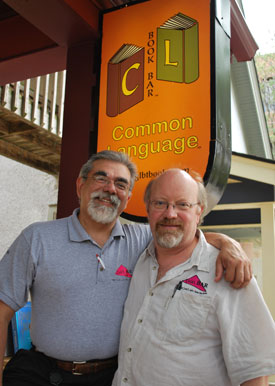
Martin Contreras and Keith Orr, co-owners of Common Language Bookshore, also own the aut BAR, located next door. (Photo by the writer.)
Less than two weeks after Shaman Drum Bookshop announced plans to close, the owners of another independent Ann Arbor bookstore are saying they could be next.
On Friday, Keith Orr – co-owner of Common Language Bookstore – sent an email to customers laying out the situation that his business faces: “There is no easy way to say this,” he wrote. “Common Language is not making enough sales to support itself. Its very existence is in peril.”
After a Chronicle reader forwarded the email to us on Monday, we went over to the store in Kerrytown’s Braun Court to talk with Orr. Sitting in the shaded courtyard in front of the shop he owns with partner Martin Contreras, Orr spoke about why they decided to reach out for help, and how he hopes the community will respond.
Contreras and Orr have been subsidizing the store with their personal savings and with money from another business they own, the \aut\ BAR, which is located in an adjacent building. They can’t continue that indefinitely – sales have to increase to support the store. Though there is a sense of crisis, Orr says, they aren’t planning to shut their doors next week or even next month. Yet they wanted to alert the community that they are struggling, and if they can’t find a way to make the bookstore financially sustainable, they’ll have to close. [Full Story]
Column: Mysterious Musings
[Editor's note: Robin Agnew and her husband Jamie own Aunt Agatha's mystery bookstore in Ann Arbor. She also helps run the annual Kerrytown BookFest.]
“The Second Death of Goodluck Tinubu” by Michael Stanley (Harper, $24.99)
As everyone knows, there is a very famous series of books set in Botswana, by Alexander McCall-Smith. McCall-Smith’s delicate prose is matched by the charm of his main character, Precious Ramotswe. Now there is a new series set in Botswana, with a slightly darker take, though the main character, Detective Kubu, would surely be friendly with Precious were they to meet.
Detective Kubu (the Botswana word for “Hippo”) is hugely fat and hugely smart. If Precious is the African Miss Marple, then Kubu is the African Nero Wolfe. Kubu and Wolfe both share a deep appreciation for the pleasures of the table, and both of them have brains that work best with their eyes closed. [Full Story]
Column: Mysterious Musings
[Editor's note: Robin Agnew and her husband Jamie own Aunt Agatha's mystery bookstore in Ann Arbor. She also helps run the annual Kerrytown BookFest.]
“The Last Child” by John Hart (Minotaur Books, $24.95)
Recently one of the VPs at St. Martin’s, Matthew Baldacci, asked if he could swing by the store with author John Hart. I had enjoyed Hart’s first book, “King of Lies,” and enthusiastically agreed – just as enthusiastically, Mathew offered to FedEx me copies of Hart’s new book, “The Last Child.” The book arrived on a Wednesday afternoon for a Thursday visit – I trundled into the store to pick it up, hoping I might get at last halfway through before Hart stopped in – and I couldn’t put it down. I was finished with the book Thursday morning, eager to have a chance to discuss it with the author. [Full Story]
Column: Mysterious Musings
[Editor's note: Robin Agnew and her husband Jamie own Aunt Agatha's mystery bookstore in Ann Arbor. She also helps run the annual Kerrytown BookFest.]
“Liars Anonymous” by Louise Ure (St. Martin’s Minotaur, $25.95)
“When had I crossed that weathered threshold that divided the world between citizens and survivors? Between what could be and what we are in our darkest hours.”
I know I’ve really enjoyed an ARC (Advance Reading Copy) of a novel when I look back and see how many pages I’ve dog-eared, for one reason or another. In the case of Louise Ure, it’s for her use of language, which is both precise and original. Sentences like “I missed my friend Catherine like she was a country I could no longer visit,” and “Her teeth had click-clacked with nervous energy while she filled out the paperwork, like a sleeping rabbit dreaming of carrots” are so evocative, and so vivid, they stay with you. It’s not often this kind of clarity is found in a hard-boiled mystery novel, but here it is. Maybe the beauty of the language is meant to carry the reader through the story of Jessie Dancing, which is one of the darker books I’ve read in a long while. [Full Story]
Column: Mysterious Musings
[Editor's note: Robin Agnew and her husband Jamie own Aunt Agatha's mystery bookstore in Ann Arbor. She also helps run the annual Kerrytown BookFest.]
“Next of Kin,” by John Boyne (Thomas Dunne Books, $15.95)
Every good book has a secret somewhere in the story – in a mystery, the secret of course is usually the identity of the killer. In John Boyne’s historical mystery, the secret is not the killer’s identity, but the killer’s very personality, his motives, and the extent of his moral depravity. This stand-alone novel is set in 1936 Britain, where one of the central issues of the day is the relationship between Edward VIII and Wallis Simpson. Of course, we know how that turns out, but Boyne offers a possible behind-the-scenes scenario that’s very interesting. [Full Story]
Open Letter 2: A Nicaraguan Interlude
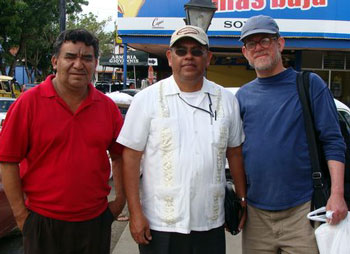
Sandy Iran Canales, Rev. Bayardo Lopez Garcia and Karl Pohrt in Catarina, Nicaragua. Pohrt was part of a delegation that traveled to Catarina to celebrate the wedding anniversary and ministry of Rev. Garcia, Padre of the Church of the Remnant.
In the midst of all the sturm und drang surrounding the future of Shaman Drum Bookshop, I went to Nicaragua.
Dianne, my wife, had been teaching for the last month in Catarina, a town in the mountains south of Managua. She volunteered under the auspices of the Episcopal Church of the Incarnation, a small congregation in Ann Arbor of which we are both members. ECI is collaborating with the Iglesia Bautista Remanente, a Baptist church in Catarina, on projects that “will bridge the divide between wealth and impoverished countries by providing capital, employment and opportunities for cultural exchange.”
Joe Summers, our minister, is an old friend of mine – we worked together in the bookshop years ago – and ECI is an openhearted, diverse community that is serious about creating a better world. Although I’ve been mostly engaged with Buddhism in my adult life, I was attracted to this church because of the willingness of Joe and the congregation to struggle together around difficult issues. And I still enjoy a good sermon.
I hadn’t had much of a chance to talk with Dianne about the state of the bookshop given that our telephone and internet connections were short and infrequent. The experience teaching in Catarina was transformative and very positive for her, but living conditions were difficult. She asked me to come. I traded my frequent flyer miles for a ticket to Nicaragua. [Full Story]
Column: Open Letter from a Distressed Bookseller
This fall and winter Shaman Drum Bookshop went into a steep financial decline. Textbook sales declined $510K from last year. We managed to cut our payroll and other operating expenses by $80K, but that didn’t begin to cover our losses.
There was some good news. Our trade (general interest) book sales on the first floor were actually up in December from last year by 10%, which is extraordinary given what many other retailers were reporting. And trades sales in January were up 15%. Still, this hardly compensates for our losses in textbook sales.
The evaporation of our position has been astonishingly swift. We had been holding relatively even financially until September. Suddenly we’ve moved into the red.
I sort of saw this coming. [Full Story]
Column: Mysterious Musings
[Editor's note: Robin Agnew and her husband Jamie own Aunt Agatha's mystery bookstore in Ann Arbor. She also helps run the annual Kerrytown BookFest, along with eight other book lovers. Versions of these book reviews first appeared in her store's newsletter.]
“A Rule Against Murder,” by Louise Penny (Minotaur Books, $24.95)
This may be the most traditional of Canadian writer Louise Penny’s now four novels, though she has been labeled from the beginning as a “traditional” mystery writer. And indeed, she does write in the same tradition that Margery Allingham, Josephine Tey and Agatha Christie were following (and helped create), but she has managed to make this old form her own. She has an exceptional gift with prose, and the character development she brings to her writing is very modern. In each book, Penny has manages to slightly change up her formula to make each story feel fresh, and this one is no exception. [Full Story]
“Mantra for Murder”
Editor’s note: “Mantra for Murder” is Ann Arbor resident Linda Fitzgerald’s first novel – this is the book’s third chapter.
Background: Since the sudden death of her husband ten months earlier, Ann Arbor freelance writer Karin Niemi has felt half-dead herself. Now she’s just desperate enough to schedule a session with Dana Lewis, the city’s celebrity psychic. In Chapter 3, Karin and her best friend set off for Dana’s home. But as they’ll soon discover, Dana has been murdered. And their jaunt across town is actually the first stage of a long and bizarre journey that will lead them into the halls of academe, the surprisingly messy lives of Ann Arbor’s social and political elite, the esoteric realm of computer hackers and black-box voting, and – strangest of all – the mysteries of the afterlife. [Full Story]
Library Friends Make Space by Cutting Prices
The Friends of the Ann Arbor District Library receives over 200,000 books every year, but they found out on Dec. 4 that the area they use for sorting them will soon be shrinking by half. The other half of the space that they use currently will be needed to accommodate equipment and materials from the Washtenaw Library for the Blind and Physically Disabled, which the AADL recently assimilated. Part of the strategy to ease the space crunch is to suspend acceptance of donations effective immediately. Expect to see signage in the library to that effect soon. [Full Story]
A Golden Age of Jazz Revisited
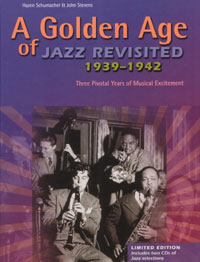 Editor’s note: The following is an excerpt from the introduction to “A Golden Age of Jazz Revisited: 1939-1942″ by Hazen Schumacher and John Stevens, published by NPP Books to be released on Nov. 14. It includes two CDs of music discussed in the book, and will be available online after Nov. 14. Schumacher is an Ann Arbor resident and jazz historian whom most readers will know from his long-time NPR show, “Jazz Revisited.”
Editor’s note: The following is an excerpt from the introduction to “A Golden Age of Jazz Revisited: 1939-1942″ by Hazen Schumacher and John Stevens, published by NPP Books to be released on Nov. 14. It includes two CDs of music discussed in the book, and will be available online after Nov. 14. Schumacher is an Ann Arbor resident and jazz historian whom most readers will know from his long-time NPR show, “Jazz Revisited.”
Almost everyone has a connection to a favorite type of music, and many can trace that connection to their years as a teen or a young adult. Music critic Whitney Balliett put it this way in The New Yorker: “The music that teenagers like penetrates their bones.” It’s as if we stop discovering new music at some point in our lives and continue to explore the music we already love. [Full Story]
I Can’t Be Un-Washed, I’m Mentioned in a Book
There’s a page on the Homeless Dave website called HD Washin’ Man, which is probably the most frequently visited page on the site. It documents a pedal-powered laundry spinner I cobbled together. It’s more popular than Bill Clinton’s teeter totter interview or even T. Casey Brennan’s. (T. Casey has a massive email contact list and he’s not bashful about using it.) I hear from T. Casey from time to time or else bump into him on my frequent trips through downtown Ann Arbor. [Full Story]
Three Books on Short List for ‘Ann Arbor/Ypsilanti Reads’
Organizers for the 2009 Ann Arbor/Ypsilanti Reads program picked a pretty ambitious theme – “The Universe: Yours to Discover.” (Oh, they mean literally the universe, not as in “a universe of possibilities.” Got it.)
A committee has narrowed the choice of books to three, and is asking people in the community to give feedback before they select the official 2009 title. Here’s what made their short list (the quoted texts are excerpts from descriptions of the books on the AAYR website):
- “Seeing In The Dark: How Amateur Astronomers Are Discovering the Wonders of the Universe,” by Timothy Ferris. AAYR says this book is “a poetic love letter to science and to the skies,” but it’s clear his work is also stuffed with … [Full Story]
Kerrytown BookFest Draws Crowds
Imagine if you were a Kerrytown BookFest exhibitor, waking up this morning to gray skies and gentle rain – not a great feeling. But by mid-morning the rain stopped and this 6th annual fair, according to several booksellers and other exhibitors, was having one of its best years ever.






